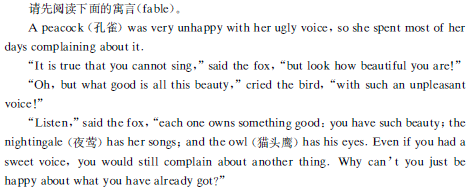
���� ����һƪ��"Do trust us-a generation born in the 90s"Ϊ����ݽ��壮������ĿҪ���֪�õ�һ�˳ƺ�һ������ʱ̬�����ݰ�����һ�����ݽ���Ŀ��������90��ľ����������ǵĶ�90������ǣ���90��ij�����������л��
�߷־��ͣ�
1��Living in an environment full of fiercer competition��we��a generation born in the 90s��are faced with more problems in entering higher schools and getting employed��������Living in an environment full of fiercer competition�����ڷִ���ԭ��״�we�����a generation born in the 90s�������ͬλ�are faced with ��ν�ﶯ�ʣ���ʾ"���"��
������һ���������Ҿ�������ᣬ���Ǿ��������ѧ�;�ҵ���涼����Ը�������⣮
2��They worry we care too much about ourselves and are unwilling to cooperate with others��which makes
it hard for us to achieve success in whatever we do��������we care too much about ourselves and are unwilling to cooperate with others�DZ���Ӿ䣬ʡ����������that��which�����������Զ���Ӿ䣬��ָ����we care too much about ourselves and are unwilling to cooperate with others�� whatever��������Ӿ� we do������ʾ"����������������"��
���ǵ�������ע�����ң���Ը������˺���������������������º��ѳɹ���
��� Good afternoon��everyone!
The topic of my speech today is"Do trust us-a generation born in the 90s"���������ݽ���Ŀ��Living in an environment full of fiercer competition��we��a generation born in the 90s��are faced with more problems in entering higher schools and getting employed�����߷־���һ��Under these circumstances��we are developing our special manners and values��which has raised people's concern��������90��ľ�����
They worry we care too much about ourselves and are unwilling to cooperate with others��which makes it hard for us to achieve success in whatever we do�����߷־��Ͷ���Besides��they consider us as lacking in perseverance��and this is what it takes to do any job well��Without it��we may easily give up in time of difficulty��They are also concerned that we are so eager to win instant fame that we follow fashion blindly��which will in turn ruin our values and future�������ǵĶ�90������ǣ�
However��we��a generation born in the 90s��have our own advantages despite some weaknesses��Firstly��we have the courage to meet challenges and take risks��which helps realize our dreams��In addition��we are quick-minded and creative��We can do our work more efficiently��Yet��we still need to learn more from those experienced��Please do trust us!��90��ij�����
Thank you for your listening!��������
Faithfully��
Li Hua
���� ������������ģ�
��������������Ҫ�ص��ǣ�Ҫ����ȷ����Χ���壬����������ڶ��ʣ������������н϶������˵����ʵ���Ϲ涨�˿���������˼·���Կ�����д����Χ���˽�Ϊ��ȷ�����������й涨��Ҫ��һ��Ҳ���ܻرܣ�����������������ٵ���Լ��������������˷��룬�����ṹ������ϵĵ��������ƽʱҪ����ϰ���������ԣ�ʹ����������



| �꼶 | ���пγ� | �꼶 | ���пγ� |
| ��һ | ��һ��ѿγ��Ƽ��� | ��һ | ��һ��ѿγ��Ƽ��� |
| �߶� | �߶���ѿγ��Ƽ��� | ���� | ������ѿγ��Ƽ��� |
| ���� | ������ѿγ��Ƽ��� | ���� | ������ѿγ��Ƽ��� |
��Ŀ������Ӣ�� ��Դ�� ���ͣ������
�鿴�𰸺ͽ���>>
��Ŀ������Ӣ�� ��Դ�� ���ͣ��������
�鿴�𰸺ͽ���>>
��Ŀ������Ӣ�� ��Դ�� ���ͣ��������
�鿴�𰸺ͽ���>>
��Ŀ������Ӣ�� ��Դ�� ���ͣ������
�鿴�𰸺ͽ���>>
��Ŀ������Ӣ�� ��Դ�� ���ͣ�ѡ����
| A�� | are visiting | B�� | will be visiting | ||
| C�� | have visited | D�� | visit |
�鿴�𰸺ͽ���>>
��Ŀ������Ӣ�� ��Դ�� ���ͣ��������

�鿴�𰸺ͽ���>>
��Ŀ������Ӣ�� ��Դ�� ���ͣ��Ķ�����
�鿴�𰸺ͽ���>>
��Ŀ������Ӣ�� ��Դ�� ���ͣ��Ķ�����
�鿴�𰸺ͽ���>>
����ʡ������Υ���Ͳ�����Ϣ�ٱ�ƽ̨ | �����к���Ϣ�ٱ�ר�� | ����թƭ�ٱ�ר�� | ����ʷ���������к���Ϣ�ٱ�ר�� | ������Ȩ�ٱ�ר��
Υ���Ͳ�����Ϣ�ٱ��绰��027-86699610 �ٱ����䣺58377363@163.com